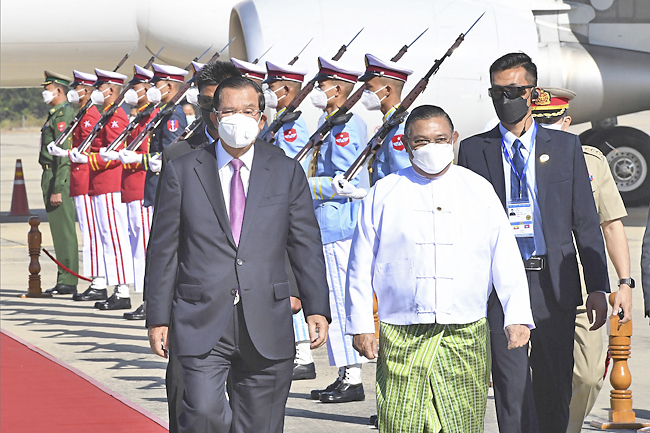BANGKOK (AP) – Cambodian Prime Minister Hun Sen’s visit to Myanmar seeking to revive peace efforts after last year’s military takeover has provoked an angry backlash among critics, who said he is legitimising the army’s seizure of power.
Hun Sen is the first head of government to visit Myanmar since the military takeover last February. The authoritarian Cambodian leader has held power for 36 years and keeps a tight leash on political activity at home.
In his role as the current chairperson of the Association of Southeast Asian Nations (ASEAN), he met with Senior General Min Aung Hlaing, who ousted the elected government of Aung San Suu Kyi, plunging Myanmar into violent conflict and economic disaster.
Photos posted by a military-related publication, the Popular News Journal, showed the two standing side by side in face masks, bumping forearms and seated on ornate gilt chairs before an elaborate golden screen.
Protests and rallies were held in some parts of Myanmar as people expressed anger over Hun Sen’s visit.

Hundreds of protesters burned portraits of the Cambodian prime minister and chanted, “Torch inhumane Hun Sen. People who engage with Min Aung Hlaing should die horrible deaths,” videos of the protest posted online showed.
Last April, ASEAN leaders, including Min Aung Hlaing, agreed on a five-point roadmap toward a peaceful settlement of the Myanmar crisis, including an end to violence and a political dialogue between all stakeholders.
The Myanmar leader was barred in October from attending ASEAN meetings after the group’s special envoy was prevented from meeting with Suu Kyi and other political detainees, which was one of the stipulations of the agreement.
Hun Sen said on Wednesday before leaving Cambodia that he had not set any preconditions for his visit. “What I would like to bring to the talks is nothing besides the five points, consensus points that were agreed upon by all ASEAN member states,” he said.
Myanmar’s military has said Hun Sen will not be allowed to meet with Suu Kyi, who was convicted in December on charges of incitement and violating coronavirus restrictions and sentenced to four years in prison – a sentence that Min Aung Hlaing then cut in half.


